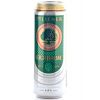Privatbrauerei Eichbaum - Pilsener
-
ABV:
4.8% -
Bottle Size:
500-ml -
Serving Temperature:
40-45° F -
Suggested Glassware:
Pilsner Glass, Flute
Eichbaum’s Pilsener pours a bright straw color with great clarity and a huge head of rocky white foam. In the aroma, we get the profile of an authentic German pils, with noble hops displaying notes of grass, hay, earth, and herbal spice, all atop a softly bready malt undertone that’s quite inviting. Look for those malty notes to create a wonderful central support on the palate too, with light notes of fresh bread and cracker. The German hops come through with moderate bitterness and a dose of spiciness and a hint of lemon zest to provide a satisfying bite alongside some lifting carbonation. The whole effect is satisfyingly crisp and refreshing, as a good German pils should be. For pairing options, we always love pizza with pilsner, along with various breaded and/or fried dishes like schnitzel, fried chicken, fish & chips, tempura, and the like. Baja-style tacos, grilled shrimp, and sushi are good calls too. Prost!
We've been doing this whole beer club thing for a long time (since 1994 to be exact), but we still get amazed by how far back the roots go for so many of our featured German breweries. For Eichbaum, the story starts back in 1679 when a Wallonian immigrant named Jean de Chaine obtained a license to open a brewpub in Mannheim. He named the brewpub, which was in his home, Zum Aichbaum (later to be spelled “Eichbaum”, or “Oak Tree” – a nod to his French name Chaine, or Chêne, meaning “oak”). Sadly, just ten years later, Mannheim was largely destroyed by the French in the War of Palatine Succession, also known as the Nine Years War, among other names.
In 1717, the original pub license was acquired by Jean Blancard who, like de Chaine, also had a Wallonian connection, having descended from a family of Wallonian brewers. He re-opened the brewpub, this time under the name Zum Grünen Eichbaum. During this time, brewing was a significant business, and in 1723 the Mannheim brewers’ guild was formed, consisting of 69 brewers from 50 different breweries (this is in a town of just 9,000 at the time).
Over the next couple hundred years the brewery expanded, beer cellars were built, fields were acquired, and the business thrived, all while Mannheim grew into a significant city. By 1900, the brewery had 147 employees plus 50 horses and 32 carts for local delivery, along with rail cars for long distance distribution. But, as with so many other breweries in Europe, the early 20th century proved to be a time of devastation as well as growth. During WWII, Mannheim was bombed repeatedly, leading to the destruction of three-quarters of all buildings. But, luckily Mannheim is located in Baden-Württemburg, a state in the southwest of Germany on the good side of the Iron Curtain, so the city rebuilt and the brewery thrived again.
After a variety of different owners over the decades, both private and corporate, the brewery is back in private hands and is among the largest breweries in Baden-Württemburg, as well as the oldest business in Mannheim. Eichbaum produces a variety of different traditional beers including Schwarzbier, Pilsner, Weissbier, Märzen, and more.

Unmatched Variety by style, brewery & country
Choose from Five different Beer Clubs offering unmatched variety by brewery,
country of origin, and beer style to suit your specific tastes.


